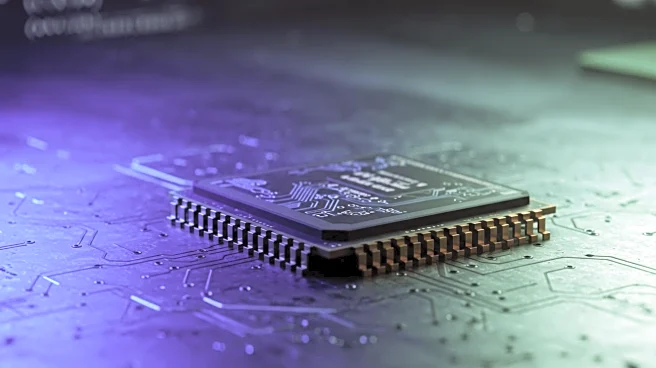What is the story about?
What's Happening?
Intel's shares experienced a significant rise following reports that the Trump administration is contemplating acquiring a stake in the company. This potential move is part of a broader strategy to bolster the U.S. semiconductor industry. The discussions, initially reported by Bloomberg, suggest that the U.S. government might utilize funds from the $52 billion CHIPS Act to invest directly in Intel. This act, signed into law in 2022, aims to enhance domestic chip production. Intel, which received nearly $8 billion from this program last year, has faced delays and cost-cutting measures under the leadership of CEO Lip-Bu Tan. The company has been struggling to maintain its competitive edge against global rivals like Taiwan's TSMC, Nvidia, and AMD. Despite these challenges, the potential government stake is seen as a possible lifeline for Intel, providing financial relief and time to revamp its foundry business.
Why It's Important?
The potential government investment in Intel underscores the strategic importance of the semiconductor industry to national security and economic stability. By considering a stake in Intel, the U.S. government aims to secure a domestic supply chain for critical technologies, reducing reliance on foreign manufacturers. This move could also signal a shift in public policy towards more direct involvement in key industries. For Intel, government backing could enhance investor confidence and provide the necessary resources to address its competitive shortcomings. However, it also highlights the company's ongoing struggles to regain its leadership position in the semiconductor market. The outcome of these discussions could have significant implications for U.S. technological leadership and the global semiconductor landscape.
What's Next?
While the White House has downplayed the reports as speculative, the potential government stake in Intel could lead to further discussions and negotiations. If pursued, this move might prompt reactions from other industry stakeholders, including competitors and international partners. The decision could also influence future policy directions regarding government involvement in private sector industries. Intel's response to these developments, along with its strategic adjustments under CEO Lip-Bu Tan, will be closely watched by investors and industry analysts. The company's ability to leverage potential government support to enhance its competitiveness will be critical in determining its future trajectory.

















